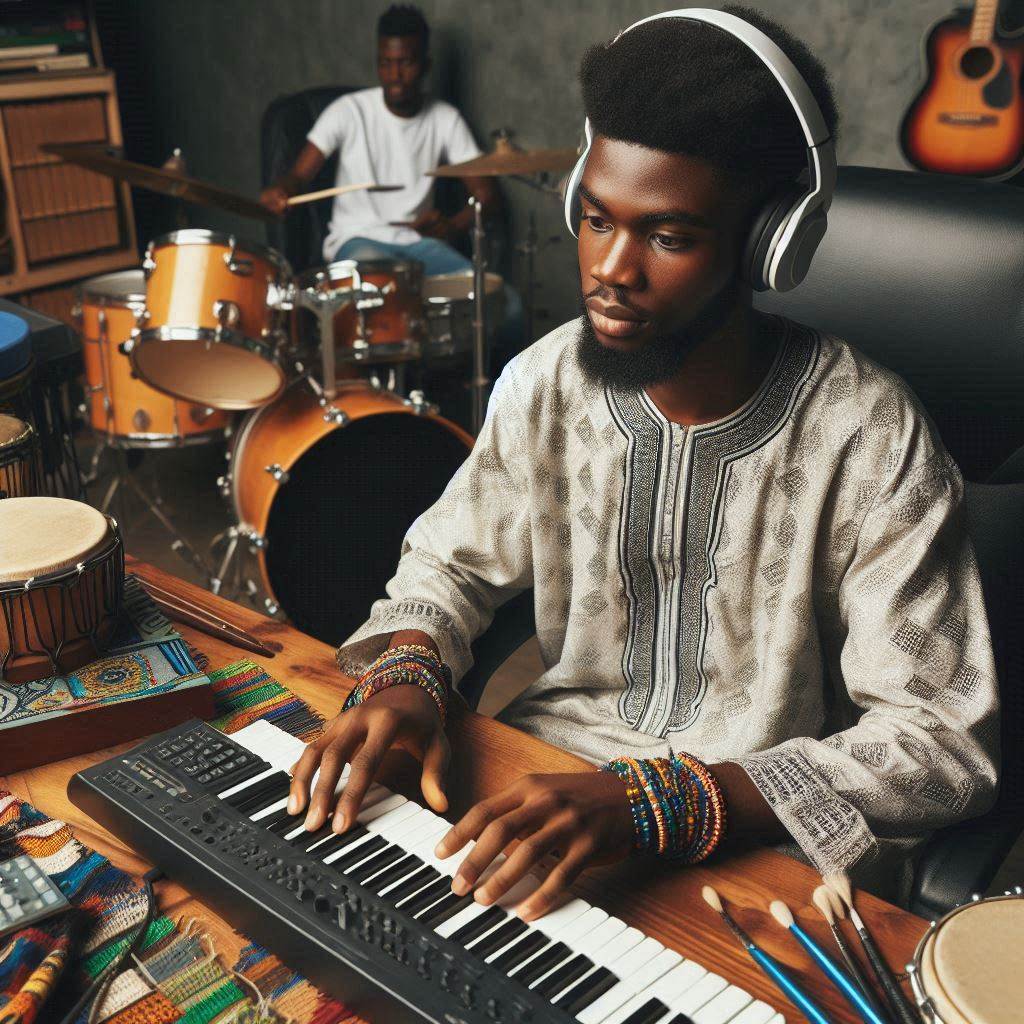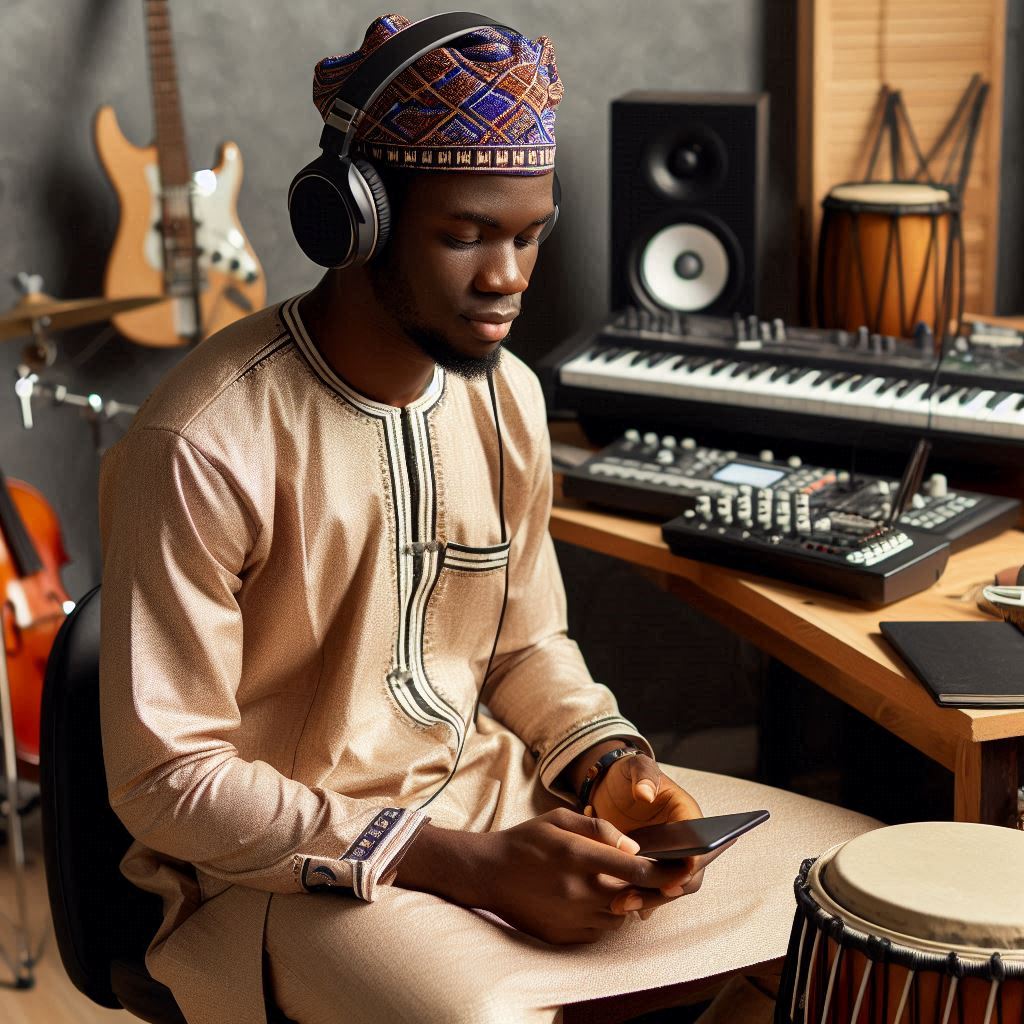Introduction
In the vast landscape of Nigeria’s music education scene, selecting the right music school is akin to choosing the perfect instrument for a symphony.
It’s a decision that requires careful consideration and thoughtful deliberation.
Aspiring musicians must navigate through a myriad of options, ranging from traditional music conservatories nestled in cultural hubs to contemporary music academies embracing cutting-edge technologies and methodologies.
Each institution boasts its unique ethos, curriculum, faculty roster, and learning environment, offering students a diverse tapestry of educational experiences to explore and engage with.
Moreover, the decision holds profound implications for one’s musical journey and future career prospects.
A good music education serves as the cornerstone for success in the dynamic and competitive music industry, equipping students with not only technical proficiency but also creativity, adaptability, and entrepreneurial acumen.
Therefore, the process of choosing the right music school transcends mere academic considerations; it’s a transformative endeavor that shapes the very trajectory of one’s musical aspirations and professional endeavors.
Consider the Location
Importance of choosing a music school that is conveniently located
One of the most crucial factors to consider when selecting a music school is its location.
Convenience in location ensures that students can easily access classes, rehearsals, and other music-related activities without enduring long commutes or transportation hassles.
By choosing a music school that is conveniently located, students can save valuable time and energy, allowing them to focus more on their studies and musical pursuits.
Moreover, a centrally located music school may offer proximity to cultural hubs, music venues, and industry events, providing students with ample opportunities for networking, collaboration, and exposure to the vibrant music scene.
Different cities in Nigeria known for their reputable music schools
In Nigeria, several cities have earned reputations for hosting reputable music schools.
Cities such as Lagos, Abuja, and Ibadan are known for their thriving music scenes and diverse cultural landscapes.
Each of these cities boasts a rich heritage of music and arts, making them ideal locations for aspiring musicians to pursue their studies.
Benefits of having easy access to the school for classes and rehearsals
Easy access to the music school offers numerous benefits for students.
It allows them to attend classes, rehearsals, and extracurricular activities without the stress and inconvenience of long commutes.
Additionally, being located nearby enables students to fully immerse themselves in their musical studies and participate more actively in school events and performances.
Moreover, easy access to the school fosters a sense of belonging and community among students, as they can easily connect with peers, faculty, and resources on campus.
Ultimately, choosing a music school with a convenient location enhances the overall educational experience and sets students up for success in their musical endeavors.
Researching the Faculty
Significance of researching the faculty members at a music school
When embarking on the journey of selecting the right music school in Nigeria, prospective students often focus on factors such as curriculum offerings, facilities, and performance opportunities.
However, one aspect that is often overlooked but is equally crucial is researching the faculty members. The faculty members at a music school play a significant role in shaping the educational experience and guiding students on their musical journey.
By researching the faculty, prospective students can gain insights into the expertise, experience, and teaching styles of the instructors who will mentor them throughout their studies.
Importance of having experienced and knowledgeable teachers
Experienced and knowledgeable teachers are invaluable assets to any music school. These instructors bring years of expertise and real-world experience to the classroom, providing students with practical insights and mentorship that goes beyond textbooks and lectures.
Moreover, experienced teachers have honed their pedagogical skills over time, allowing them to effectively convey complex musical concepts and techniques to students of all levels.
By learning from seasoned professionals, students can develop a solid foundation in music theory, technique, and performance, setting them up for success in their musical endeavors.
How to research the qualifications and expertise of the faculty members
When researching the qualifications and expertise of the faculty members, prospective students can employ various strategies to gather relevant information.
Start by visiting the music school’s website and reviewing the faculty profiles, which often provide detailed information about their educational background, performance experience, and teaching philosophy.
Additionally, consider reaching out to current or former students to inquire about their experiences with specific faculty members.
Attend faculty-led workshops, masterclasses, or recitals if possible, to observe their teaching style and interact with them directly.
In a nutshell, don’t hesitate to ask questions during campus visits or admissions interviews to gain deeper insights into the faculty’s qualifications and teaching approach.
By thoroughly researching the faculty members at a music school, prospective students can make informed decisions about their educational journey and ensure they receive high-quality instruction that aligns with their musical aspirations and goals.
Therefore, when evaluating potential music schools, prioritize institutions with experienced, knowledgeable, and passionate faculty members who are dedicated to nurturing the next generation of musicians.
Read: Scholarships for Music Students in Nigeria
Check the Facilities
Importance of examining the facilities and equipment available at the music school
When embarking on the journey of selecting the right music school in Nigeria, prospective students often prioritize factors such as faculty expertise, curriculum offerings, and location.
However, one aspect that should not be overlooked is the examination of the facilities and equipment available at the music school.
These resources play a vital role in providing students with a conducive learning environment and fostering their musical growth.
Impact of having access to state-of-the-art instruments and recording studios
Access to state-of-the-art instruments and recording studios can significantly impact a student’s musical journey.
High-quality instruments allow students to develop their technical skills and artistic expression to their fullest potential.
Likewise, modern recording studios provide students with opportunities to explore music production techniques and bring their creative visions to life.
Such facilities not only enhance the learning experience but also prepare students for the demands of the professional music industry.
Guidance on how to assess the quality of the facilities during a visit to the music school.
During a visit to the music school, prospective students should conduct a thorough assessment of the facilities.
Start by examining the condition and functionality of the practice rooms, performance spaces, and teaching studios. Look for signs of wear and tear, cleanliness, and proper maintenance.
Test out the instruments and equipment to ensure they are in good working order. Additionally, inquire about the availability of resources such as soundproofing, audio equipment, and recording technology.
Don’t hesitate to ask questions and seek clarification from staff members about the facilities available and how they support students’ musical development.
By meticulously evaluating the facilities and equipment during a visit to the music school, prospective students can gain valuable insights into the resources available to support their musical journey.
Prioritize institutions that invest in state-of-the-art facilities, as they demonstrate a commitment to providing students with the best possible learning environment.
Ultimately, access to high-quality facilities can make a significant difference in the educational experience and future success of aspiring musicians.
Read: Famous Nigerian Musicians with Music Degrees
Look at the Curriculum
Reviewing the curriculum of a music school is crucial
- Choosing a school with a well-rounded music program is beneficial.
- Evaluate the curriculum to ensure it aligns with the student’s goals.
- Check if the curriculum includes a variety of music genres.
- Ensure the school offers both theoretical and practical courses.
When choosing the right music school in Nigeria, one of the key factors to consider is the curriculum offered by the institution.
The curriculum plays a significant role in shaping the educational experience of the students and influencing their growth as musicians. Here are some important points to keep in mind when evaluating the curriculum of a music school:
Importance of Reviewing the Curriculum
Reviewing the curriculum of a music school is essential because it gives you an overview of the courses and programs offered by the institution.
By understanding the curriculum, you can determine if the school provides the necessary training and resources to help you achieve your musical goals.
Additionally, a thorough review of the curriculum can help you assess the quality of education offered by the school and make an informed decision about whether it aligns with your interests and aspirations.
Benefits of Choosing a School with a Well-Rounded Music Program
Opting for a music school with a well-rounded music program can bring several benefits to students.
Such programs usually incorporate a diverse range of musical styles, techniques, and practices, which can help students develop a broad understanding of music and enhance their skills in various areas.
A comprehensive music program can also provide students with opportunities to explore different genres and specialties, allowing them to discover their strengths and interests within the field of music.
Tips on Evaluating the Curriculum
Here are some tips on how to evaluate the curriculum of a music school to ensure it aligns with your goals and interests:
- Look for programs that offer a balanced mix of theoretical and practical courses.
- Check if the curriculum includes courses that cater to your specific interests or areas of focus.
- Consider the expertise and experience of the faculty members who will be teaching the courses.
- Ask about opportunities for performance, collaboration, and real-world experience within the curriculum.
- Seek feedback from current or former students about their experiences with the curriculum and the quality of education provided.
By carefully examining and evaluating the curriculum of a music school, you can ensure that you choose the right institution that will support your musical journey and help you achieve your goals in the field of music.
Read: Nigerian Music Schools: Curriculum Overview

Learn More: Benefits of Studying Foreign Languages in Nigeria
See Related Content: Career Paths in Nigerian TV Production Industry
Gain More Insights: How European Languages Influence Nigerian Cultures
Consider the Performance Opportunities
Importance of considering the performance opportunities provided by the music school
When embarking on the journey of choosing the right music school in Nigeria, prospective students often focus on factors such as faculty expertise, curriculum offerings, and facilities.
While these aspects are undoubtedly essential, one crucial element that should not be overlooked is the availability of performance opportunities.
A music school that prioritizes performance opportunities provides students with a platform to showcase their talents, refine their skills, and gain invaluable real-world experience.
By participating in various performance events, students can apply the theoretical knowledge and technical skills acquired in their lessons to practical scenarios, fostering holistic musical development.
Benefits of participating in concerts, recitals, and competitions
Participating in concerts, recitals, and competitions offers numerous benefits to music students. These events allow students to share their musical gifts with others, providing a sense of fulfillment and joy.
Moreover, performing in front of an audience helps students develop confidence and stage presence, essential qualities for any aspiring musician.
Additionally, the preparation process for performances encourages students to refine their musical interpretation, hone their technical skills, and cultivate discipline and dedication.
Furthermore, competitions provide students with opportunities for recognition and networking within the music industry, potentially opening doors to future career opportunities.
Performance experience can enhance a student’s musical skills and confidence
The experience gained from participating in performances goes beyond mere exposure. It directly enhances a student’s musical skills, as well as their confidence and self-assurance.
Performing in front of an audience requires musicians to be proficient in their craft, to communicate effectively through their music, and to maintain composure under pressure.
As students repeatedly engage in performance opportunities, they become more adept at interpreting musical nuances, expressing themselves artistically, and connecting emotionally with their audience.
Furthermore, the constructive feedback received from instructors and peers during performances enables students to identify areas for improvement and strive for excellence in their musical endeavors.
Ultimately, performance opportunities play a vital role in shaping the musical development and future success of students at music schools in Nigeria.
By actively participating in concerts, recitals, and competitions, students can refine their skills, build confidence, and establish themselves as well-rounded musicians prepared for the challenges and opportunities of the professional music world.
Therefore, when choosing a music school, aspiring musicians should prioritize institutions that offer ample opportunities for performance and artistic expression.
Read; Top 8 Music Conservatories in Nigeria
Evaluate the Cost
Significance of evaluating the cost of tuition and other fees at the music school
When embarking on the journey of selecting the right music school in Nigeria, one of the most critical aspects to consider is the cost of attendance.
Understanding the financial implications of tuition, fees, and other expenses is essential for making an informed decision.
By evaluating the cost upfront, aspiring musicians can avoid unexpected financial burdens down the road and ensure that they select a school that aligns with their budget and financial goals.
Various financial aid options available for students in Nigeria
Fortunately, there are various financial aid options available for students in Nigeria to help alleviate the cost of attending music school.
Scholarships, grants, and student loans are among the most common forms of financial assistance. Scholarships are typically awarded based on academic merit, talent, or financial need and do not require repayment.
Grants are often need-based and provided by governments, institutions, or private organizations. Student loans, on the other hand, must be repaid with interest but can help cover the cost of tuition and living expenses.
Transform Your Career with Expert Guidance
Get personalized mentorship consulting that’s tailored to your unique path. Our expert advice is actionable and exclusive.
Get StartedHow to budget and plan for the expenses associated with attending a music school.
In addition to exploring financial aid options, it’s crucial for aspiring musicians to create a comprehensive budget and financial plan to manage expenses effectively.
Start by estimating the total cost of attendance, including tuition, fees, accommodation, transportation, and instrument costs. Research affordable housing options near the school and consider sharing accommodations with roommates to reduce expenses.
Explore part-time job opportunities or freelance gigs that can provide additional income while studying. Additionally, consider purchasing used instruments or renting equipment to save money upfront.
By prioritizing financial responsibility and planning ahead, aspiring musicians can ensure that pursuing a music education remains within reach without compromising their financial stability.
Overall, evaluating the cost of attending a music school in Nigeria is a critical step in the decision-making process for aspiring musicians.
By understanding the financial investment required and exploring available financial aid options, students can make informed decisions that align with their budget and financial goals.
Additionally, creating a comprehensive budget and financial plan ensures that students can manage expenses effectively while pursuing their passion for music.
With careful planning and prudent financial strategies, aspiring musicians can embark on their musical journey with confidence and peace of mind.
Conclusion
In concluding our exploration of selecting the ideal music school in Nigeria, it becomes apparent that this decision is not merely about choosing an educational institution but embarking on a transformative musical odyssey.
Throughout this discourse, we have meticulously dissected the myriad factors that must be weighed and considered by aspiring musicians.
From the diverse array of music schools dotting the Nigerian landscape to the profound impact of a quality music education on one’s future career prospects, each facet contributes significantly to the tapestry of one’s musical journey.
Therefore, it is paramount for individuals to approach this decision with deliberation, diligence, and foresight.
By meticulously researching, visiting prospective schools, and evaluating all pertinent factors, aspiring musicians can ensure that they find the perfect harmony between their educational aspirations and career ambitions.
So, let patience be your guiding virtue, let curiosity be your compass, and let passion be your driving force as you navigate the intricate symphony of selecting the right music school in Nigeria.
After all, it is not merely a decision; it is the first chord in the melody of your musical legacy.




